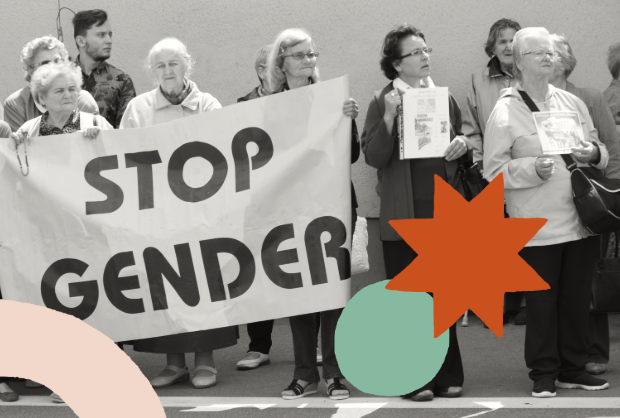In recent years, the anti-gender movement has emerged to become one of the most significant threats to the rights of women and LGBT+ people in Europe and the rest of the world.
Rooted in conservative, religious and nationalist environments, the movement has gained ground across borders – and Denmark is no exception. It is seen not only as a continuation of familiar anti-feminism but as a new phenomenon that seeks to establish a nationalist, neo-conservative response to social change.
At the same time, researchers report an alarming rise in political and social forces that seek to restrict rights that were considered secure by many.
Against abortion and gender education
Some of the means consist of using rhetoric about rolling back abortion rights, calling it treason when people choose not to have children like members of Young Conservatives did earlier this year, and opposing gender diversity education in schools. The purpose is to influence the political landscape and the public debate.
In a Danish context, one of the first public actions was the 2023 protest against a drag show for children at Frederiksberg Library. A woman was at the forefront of the protest, saying she couldn’t bear the thought of her own children seeing a drag show.
But anti-gender is more complicated and bigger than a mother’s opinion.
The beginning of anti-gender: Catholics against progress
The anti-gender movement emerged as a reaction to progress made for the rights of women and LGBT+ people in the 1990s, including the landmark World Conference of Women held in Beijing in 1995. The UN conference made gender equality and women’s rights a global principle.
It wasn’t welcomed in all corners of the world.
The anti-gender movement was first seen in mainly Catholic but also more generally conservative groups in Europe and quickly developed into an international movement.
Against ‘gender ideology’ and for ‘natural order’
The concept of ‘gender ideology’ is central to the movement. It refers to thoughts and ideas that are considered dangerous.
They include feminism, promoting the rights of sexual minorities and teaching gender studies in schools and universities.
One of the key players in the movement is the Vatican, which is not only calling for a culture war. It’s also a matter of preserving traditional, patriarchal structures and defending what the movement perceives as ‘the natural order’.
Coordinated response and the invention of a common enemy
The anti-gender movement emerged as a coordinated response from religious and right-wing groups determined to stop what they considered to be an international threat to traditional gender roles and family patterns.
This is detailed in the 2017 book Anti-Gender Campaigns in Europe: Mobilizing against Equality. It also shows how anti-gender rhetoric was used to create a common enemy to mobilise various movements across national borders. This was seen as particularly important in Europe where these campaigns managed to take root in countries like Poland and Hungary and later spread to Western and Northern Europe. The anti-gender campaigns became a way to connect the political right and religious conservatives.
Since the early 2010s, the anti-gender movement has spread across the globe among organisations, politicians and activists who all share an opposition to modern gender perceptions and LGBT+ rights. In a number of countries, governments have used anti-gender rhetoric as a political tool to restrict fundamental rights, including access to abortion, legal recognition of sex change and sex education in schools.
The influence of the Catholic Church in particular is still evident. Former Pope Francis has described ‘gender ideology’ and transgender people as comparable to nuclear weapons, both having the potential to destroy the basis of life and undermine the natural order.
Associated with authoritarianism
The anti-gender movement has close relations to authoritarian tendencies. Governments seeking to cement and centralise power are now happy to use anti-gender rhetoric to appeal to voters who feel threatened by globalisation and cultural change and to create an external enemy to justify restrictions on fundamental civil rights.
Poland and Hungary are often and rightly highlighted as examples of this development in Europe. In both countries, as well as in countries like Serbia, governments have used anti-gender rhetoric to undermine women’s reproductive rights and the legal equality of LGBT+ people. Hungarian Prime Minister Viktor Orbán has blocked legislation that protects the rights of transgender people under the pretext of protecting ‘family values’. That term – family values – is recurring.
Strong men for family values
The movement is also gaining ground outside the EU, almost always driven by so-called strongmen, male politicians with ambitions of absolute power.
In the US, Donald Trump has made anti-gender a central part of his political platform. So have Vladimir Putin in Russia and President Recep Erdoğan in Türkiye. And Jair Bolsonaro did it as president of Brazil. They appeal to fears of societal change and portray ‘traditional values’ as simple solutions to complex challenges.
The same thing is currently happening in Georgia. In Georgia, KVINFO is working with a number of organisations committed to women’s rights, which invariably brings them into conflict with strong right-wing, anti-gender forces.
One of these organisations, Sapari, works against gender-based violence and monitors the right-wing national movement in the country. The organisation is headed by Baia Pataraia, who has personally investigated far-right groups. She explains,
‘Authoritarianism and nationalism are the two values that most clearly tie this group of people together. They say they prefer a strong leader and that this is more important to them than a liberal democratic system.’
Hard, patriarchal values
Sapari’s research in Georgia also shows that many of the men involved express ‘nostalgic feelings’ associated with ‘hard, patriarchal values’.
Pataraia concludes,
‘Those who fight gender equality are fighting equality in general. They fundamentally believe that society should be hierarchical. Men at the top of the pyramid.’
The Danish Ministry of Foreign Affairs confirms Pataraia’s conclusion. In a 2021 analysis, the ministry found the anti-gender movement in Georgia to have a widespread belief that opposition to feminism is necessary to ‘protect the nation’ from moral corrosion. Traditional patriarchal values are considered fundamental to the very survival of the nation.
International trend towards democracy and rights
At the University of Gothenburg, the V-Dem Institute collects and processes huge amounts of data to feel the pulse of democracy in countries around the world.
The institute now warns against widespread autocratization, stating in its latest report that it is necessary to go back to 1985 to find the same low level of democracy that the average person on the planet can expect in 2024. For the 15th year in a row, more people live under autocratic regimes than in democratic countries.
This tendency and the anti-gender movement influence each other. Among other places, this is evident in Hungary where President Orban claimed in his 2018 election victory that he has ‘replaced a shipwreck of a liberal democracy with a Christian democracy of the 21st century.’ Orban also said that this particular ‘Christian democracy’ is based on the traditional concept of family where one man and one woman form a sacred unit.
According to Amnesty International, Türkiye’s move towards greater autocracy is also based on a fight for so-called traditional family values, which has led the government to become the first country in Europe to withdraw from the Istanbul Convention which puts all countries under an obligation to combat violence against women.
Obsessed with gender
Right-wing populist movements across Europe have an ‘obsession with gender and sexuality.’ So says Austrian political scientist Birte Sauer, author of the book Right-Wing Populism and Gender, European Perspectives and Beyond.
According to Sauer, far-right politicians advocate a heteronormative family structure as a model for broader social order while attacking sexual and reproductive rights, sex education in schools and the idea that a family can consist of two adults of the same sex.
Sauer writes that the anti-gender arguments are often part of a larger narrative about the struggle of the broad, ‘ordinary’ population against arrogant, unrealistic metropolitan elites.
Minority rights are everyone’s rights
Human rights organisations like Human Rights Watch see the same tendency. The organisation puts the negative obsession with gender and sexuality into a broader perspective.
When anti-gender groups attack the rights of minorities as is happening to LGBT+ people to an alarming extent, it should be seen as an attack on the rights of all people; these are movements that break down societies with equal rights for all.
Human Rights Watch writes that from Guatemala to the United States to Hungary, reactionary forces are working to ban the portrayal of LGBT+ people and families, which the organisation sees as part of the larger struggle against the basic premises of liberal democracy.
Democratic threat
In this light, the anti-gender movement appears not only as a threat focussed on gender and sexuality but also against the future of democracy.
When rights for women, transgender people and sexual minorities are restricted or attempted to be restricted, it is often a warning that other civil rights will be restricted too.
Like when governments tell women where they can go, who they can or must go with, what they should wear and whether or not they can be pregnant, Human Rights Watch emphasises.


